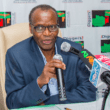Twenty eight Civil Society Organisations (CSOs) have petitioned the National Assembly to pass a resolution revoking the Threatened State of Emergency, arguing that there no longer exists a situation threatening the security of the country.
At a press briefing today, Non-Governmental Organisations Coordinating Council (NGOCC) executive director Engwase Mwale said the CSOs resolved to petition the National Assembly after reviewing various presentations that were submitted at a Zambia Council for Social Development (ZCSD) organiseed stakeholders consultative meeting recently.
“Following presentations from the Zambia Police Service, Ministry of Justice, legal experts and Civil Society Organisations at the stakeholders consultative meeting organised by the Zambia Council for Social Development (ZCSD) on the threatened state of emergency which was held at the Royal Shalom Lodge in Lusaka, on August 24, 2017, we have resolved to petition the National Assembly to pass a resolution revoking the Threatened State of Public Emergency as a situation no longer exists for its continued existence,” Mwale said.
“Acknowledging the proclamation of the Threatened State of Emergency by President Edgar Lungu on 5th July, 2017 and approved by the National Assembly of Zambia on 12th July, 2017, we have realised that the situation which led to that proclamation no longer exists and we are convinced that the tension that existed and led to the unfortunate happenings and the proclamation of the Threatened State Public Emergency has been brought under a considerable control and room for dialogue can be cemented.”
Mwale said the CSOs called on the Ministry of Justice to release the Justice and Legal reform commission report in order to curtail any future arson and vandalism to public property in the country.
“To curtail any future arson and vandalism to public property, government invokes provision of the protected places and areas Act – CAP 125 of the Laws of Zambia and the Anti – Terrorism Act No. 2 of 2015, the state security Act (CAP 111); and the immediate undertaking of Constitutional and Electoral reforms and the Criminal Justice system ahead of the 2021 General elections, the Ministry of Justice should release the Justice and Legal reform commission report. We would also like to take this opportunity to launch the Monitoring and Tracking of human rights abuse/violations during the period of the threatened state of emergency,” said Mwale.
And Young African Leaders Initiative (YALI) President Andrew Ntewewe said the Threatened State of Emergency should be revoked in readiness for the national day of prayer, fasting and reconciliation.
“As Civil society we can only call on our Members of Parliament to do the correct thing and ensure that the Threatened State of Emergency is revoked. But just to add on, to this day I think one of the biggest legacies of President Edgar Lungu is that he launched October 18 as a day for reconciliation, prayer and fasting, maybe the question would be, how are we going to fast, pray and reconcile amongst ourselves if we are going to be living in fear of the Threatened Sate of Emergency? It won’t make sense. So because the President is always prayerful, he is always fasting and that he wants all of us to fast and pray as well, we ask in earnest that come next month, we want to pray and fast in the absence of Threatened Public Emergency,” said Ntewewe.
Meanwhile, Civil Society Constitutional Agenda (CiSCA) Publicity Secretary Macdonald Chipenzi said: “For me this is a call of unity to all of us that this Threatened State of Public Emergency will affect all of us including the media personnel. Above all, it’s to call on civil society organisations in the electoral process that today as we are talking, we need agent electoral reforms and this is why this resolution comes at a no better time like now where the Electoral Commission of Zambia (ECZ) is going through a self restructuring process which requires us to also take keen interest.”
“So these resolutions and the unity among civil societies should continue to be amplified as we get towards the end of the Threatened State of Emergency. If we don’t push the Parliamentarians then they might extend or the President might start a new State of Emergency and then extend it again for 90 days. So it will depend on us as citizens to start telling the President and whoever else that these fires that we witnessed before have continued even under the threatened state of emergency,” said Chipenzi.












